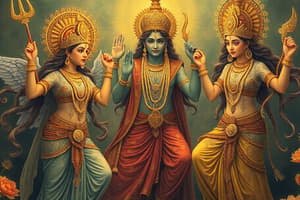Podcast
Questions and Answers
What is the term used to refer to Hindu gods?
What is the term used to refer to Hindu gods?
- Ishvara
- Devi
- Brahman
- Deva (correct)
Which of the following is NOT a major Hindu deity?
Which of the following is NOT a major Hindu deity?
- Vishnu
- Krishna (correct)
- Brahma
- Shiva
What is the concept of Ultimate Reality in Hinduism?
What is the concept of Ultimate Reality in Hinduism?
- Ishvara
- Brahman (correct)
- Devi
- Deva
What is the purpose of Murti in Hinduism?
What is the purpose of Murti in Hinduism?
What is the Triad or Trimurti in Hinduism?
What is the Triad or Trimurti in Hinduism?
What is the significance of Avatars in Hindu mythology?
What is the significance of Avatars in Hindu mythology?
What is the Yajurveda?
What is the Yajurveda?
What is the purpose of pujas in Hinduism?
What is the purpose of pujas in Hinduism?
What is the Hindu ethos and way of life?
What is the Hindu ethos and way of life?
Flashcards
Devas and Devis
Devas and Devis
Hindu deities, both gods and goddesses, representing forces of nature and moral values.
Brahman
Brahman
The ultimate reality in Hinduism, encompassing all deities and considered genderless.
Murti
Murti
An image of a god, representing emotional and religious value but not the god itself.
Puranas
Puranas
Signup and view all the flashcards
Avatars
Avatars
Signup and view all the flashcards
Trimurti
Trimurti
Signup and view all the flashcards
Deity worship
Deity worship
Signup and view all the flashcards
Pluralism and polycentrism
Pluralism and polycentrism
Signup and view all the flashcards
Hindu traditions
Hindu traditions
Signup and view all the flashcards
Study Notes
Gods and Goddesses in Hinduism:
-
Hindu deities include gods and goddesses, referred to as Deva and Devi respectively.
-
The concept of Hindu deities has evolved over time and across various regions and traditions.
-
Hindu deities range from personal gods to hundreds of deities mentioned in the Puranas of Hinduism.
-
Major deities include Vishnu, Lakshmi, Shiva, Parvati, Brahma, and Saraswati.
-
Deities have distinct and complex personalities but are often viewed as aspects of the same Ultimate Reality called Brahman.
-
Hindu traditions include Vaishnavism, Shaivism, and Shaktism, with shared mythology and ritual grammar.
-
Hindu deities are represented with various icons and anicons in paintings and sculptures.
-
Devas and Devis represent forces of nature and some represent moral values.
-
In Vedic literature, all supernatural beings are called Asuras, and in post-Vedic texts, the Devas represent the good, and the Asuras the bad.
-
Deities in Hinduism are as diverse as its traditions, and a Hindu can choose to be polytheistic, pantheistic, monotheistic, monistic, agnostic, atheistic, or humanist.
-
Ishvara is another Hindu term that is sometimes translated as deity, but its meaning varies depending on the era and school of Hinduism.
-
The number of deities in Hinduism ranges from three according to the Vedas to 33 according to ancient texts.Overview of Hindu Deities and Worship Practices
-
Hinduism recognizes a vast pantheon of deities, with major gods and goddesses including Vishnu, Shiva, Devi, Brahma, Ganesha, and Hanuman, as well as many others.
-
The concept of God in Hinduism is that everything is connected and essentially one thing, with all deities viewed as emanations or manifestations of a genderless principle called Brahman, representing the many facets of Ultimate Reality.
-
Hinduism has an extensive iconography tradition, particularly in the form of Murti, which is an image of a god and represents emotional and religious value, but is not the god itself.
-
Deity worship, visiting temples, and performing Puja rituals are not mandatory and are optional in Hinduism, with worship practices being as diverse as its traditions.
-
The Triad, or Trimurti, is a relatively late concept in Hindu literature, typically associated with Brahma, Vishnu, and Shiva, but other triads include Tridevi, Sun, Air, and Fire, and Prana, Food, and Time.
-
Avatars are a central concept in Hindu mythology, most developed in the Vaishnavism tradition and associated with Vishnu, particularly with Rama and Krishna.
-
The Yajurveda mentions thirty-three koti (33 supreme) divinities, most of which are goddesses, highlighting their importance and popularity in Hindu culture.
-
A Murti is typically made by carving stone, wood working, metal casting, or pottery, with expressions varying from Ugra symbolism to express destruction, fear, and violence, to Saumya symbolism to express joy, knowledge, and harmony.
-
The worship of deities and their icons may be hosted in a Hindu temple, within a home, or as an amulet, with various pujas performed daily at various times of the day or occasional.
-
Pluralism and "polycentrism," where other deities are recognized and revered by members of different "denominations," is the Hindu ethos and way of life.
-
Major deities have inspired a vast genre of literature, such as the Puranas and Agama texts, as well as their own Hindu traditions, with shared mythology, ritual grammar, theosophy, axiology, and polycentrism.
-
Major regional and pan-Indian Hindu deities include Ganesha, Hanuman, Kali, Durga, Saraswati, Lakshmi, and many others.
Studying That Suits You
Use AI to generate personalized quizzes and flashcards to suit your learning preferences.




